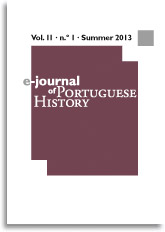


| CURRENT ISSUE | |||||||||||||
 |
Portuguese History in a Global Context
Onésimo T. Almeida1
The founding team, which also composes the group of editors of the e-Journal of Portuguese History decided to celebrate the journal’s tenth year of existence by organizing a colloquium where some key issues in Portuguese History could be revisited. The idea was to make it happen in an American university since that would present an opportunity to bring those issues to the English-speaking world, particularly through the ensuing publication of the papers. The goal was to revisit some key topics of the most important periods of Portuguese history. It was also decided to dedicate a closing session to four significant books on Portuguese themes by Anglo-American historians. However, given the fact that it was a colloquium to take place in an English-speaking country, it seemed fitting to find a venue to honor some Anglo-American historians who have devoted significant parts of their careers to the study of Portuguese history. This, it was thought, would be best done through the dedication of a special session of the colloquium to their works. An agreement was easily reached on the authors: Charles Boxer, Peter E. Russell, A. J. R. Russell-Wood, and Kenneth Maxwell, four lusophile historians whose writings have greatly contributed to the understanding of Portuguese history not only in the English-speaking world but also in the Lusophone world. Of course, when a list of this kind includes a figure of the statue of Charles Boxer, whose scholarly breadth covers centuries, any attempt of assessing his work becomes an impossible task. To complicate matters, Russell-Wood’s writings also, though to a much lesser degree, covered various centuries. The same holds for Maxwell, who started as an historian of the Enlightenment but later moved to twentieth-century topics. It was then agreed that the revisitation should focus on one single book of each author. The next step was to identify Portuguese scholars to take on those four books. Some of the choices were more than obvious. Diogo Ramada Curto had recently edited the complete works of Charles Boxer, and the Medievalist Luís Adão da Fonseca has written extensively on Medieval Portugal and particularly on the Luso-British relations in the late fourteenth century, hence his natural selection to take on Peter Russell’s book. Nuno Monteiro’s academic credentials for his work on the Portuguese Enlightenment made him a natural choice to revisit Kenneth Maxwell’s classic on the subject. Mafalda Soares da Cunha was the unanimously suggested name for the assessment of Russell-Wood’s work. The colloquium took place at Brown University on 11–12 October 2012 and the above mentioned particular session actually closed the event. As in all sessions, an open discussion followed. Afterwards, the authors of the papers where asked to take into account the comments, criticisms, and suggestions received and to prepare a final version to be published in this issue of the e-Journal of Portuguese History. As it turned out, Diogo Ramada Curto’s paper took on a life of its own, expanding to become a long essay distancing itself from the format and approach of the other three. The editors of the e-jph opted to publish it as a separate article in this same issue of our journal. The complete program of the event can be found by clicking on this sentence; it is hosted on the website of the Department of Portuguese and Brazilian Studies of Brown University, that hosted the colloquium. The other papers presented at the conference should also appear in the next issues of this journal. We thank the Luso-American Foundation, the Gulbenkian Foundation, the Instituto de Ciências Sociais of the University of Lisbon, C. I. D. E. H. U. S, University of Évora, the John Carter Brown Library, and CEPESE for having made this colloquium possible.
Note 1 Brown University. Department of Portuguese and Brazilian Studies. Providence, Rhode Island 02912, USA. E-mail: [email protected] Copyright
2013, ISSN 1645-6432
|
||||||||||||
| ...... | ....................................................................................................................................................................................................................................................................... | ||||||||||||
| COPYRIGHT@ 2008 E-JOURNAL OF PORTUGUESE HISTORY, ALL RIGHTS RESERVED webdesign TVM DESIGNERS | |||||||||||||